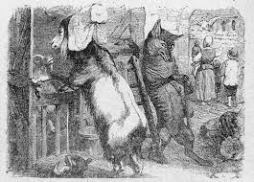The French idiom ‘comme les moutons de Panurge’ translates directly into English as ‘like Panurge’s sheep’, with a meaning equivalent to ‘like sheep’, which is used to describe people who blindly follow the crowd.
This originates from the novel Gargantua and Pantagruel by François Rabelais, in which Panurge, described as being a crafty knave, buys a sheep from the vendor Dindenault, and having found that he had been overcharged for this sheep, throws it crying and bleating into the sea as revenge. The rest of Panurge’s sheep, having seen this, then follow suit, crying, bleating and jumping into the sea despite the Panurge’s efforts to stop them.
This story, about the nature of sheep who instinctively and stubbornly follow the crowd without forethought, is comparable to the English idiom ‘like lemmings off a cliff’, which are used to describe those who do the same as those around them.
Panurge is from the Classical Greek panourgos, meaning knavish, ready for anything, pan = any/everything and ourgos from ergon = work.
Sources:
Collins- easy learning- French Idioms





